Madison Square, located in the Flatiron district, is one of the historically most important squares in New York City. The attractive Madison Square Park is surrounded by historic landmarks from the Gilded Age, including the famous Flatiron Building and the iconic Metlife Tower.
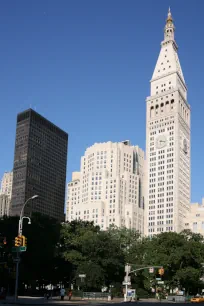
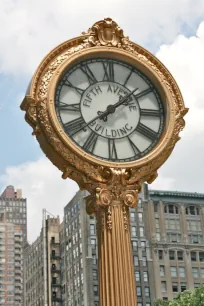
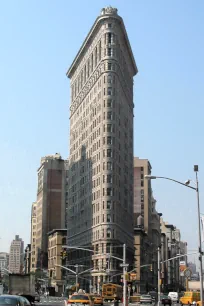
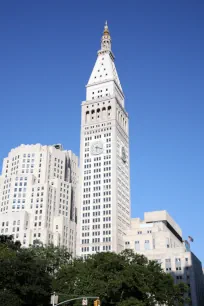
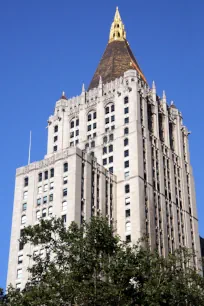
Manhattan’s Shopping Paradise
The first decades after Madison Square Park was officially designed as a public space in 1847, Madison Square was mostly a residential area. From 1859 onwards, with the opening of the Fifth Avenue Hotel, the area started to become the center of New York’s social life. Many major hotels moved into the area, followed by retailers and the entertainment industry.
At the turn of the nineteenth century, Madison Square had become Manhattan’s shopping paradise. Such was the concentration of shops that the section of Broadway between Union Square and Madison Square became known as the Ladies’ Mile. Most of the retailers have long moved up town, but many of the buildings in the area have been preserved.
Flatiron
During its heyday at the beginning of the twentieth century, Madison Square became a prime office location. The most famous building in the district, the Flatiron Building, was constructed in 1902 by the famous Chicago architect Daniel Burnham in the then popular Beaux-Arts style. Initially named Fuller building after the construction company that originally occupied the building, the 21-story building was soon dubbed Flatiron because its triangular shape resembles that of a flat iron. Its shape and height made the Flatiron one of New York’s most recognized landmarks.
Metlife Tower
In 1909, the Metlife Tower was constructed near Madison Square Park as the new headquarters of the Metropolitan Life Insurance Company. It was added to the original 1893 headquarters. The 700ft (213 m), 51 stories tall building was modeled on the campanile at St. Mark’s Square in Venice. When constructed, it was the tallest building in the world. It would keep that title until the completion of the Woolworth Building in 1913.
Next to the Metlife Tower, across 24th Street, is another Metropolitan Life Insurance Building, known as the ‘North Building’. This Art Deco building was designed to be an immense 100-story-tall tower. This tower would hand the title of the world’s tallest building back to the Metropolitan Life Insurance Company, but the Great Depression made an abrupt end to these plans: only the 29 first floors were built before construction was halted in 1932.
NY Life Insurance Company Building
Another imposing building near Madison Square is the New York Life Insurance Company Building. It was erected in 1928 at the site of the original Madison Square Garden. The NY Life Insurance Company building is known for its octagonal gilded spire. Its design by Cass Gilbert (architect of the Woolworth Building) was inspired by the Salisbury Cathedral in England.
One Madison
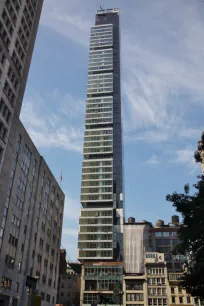
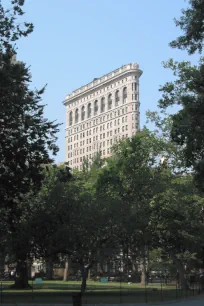
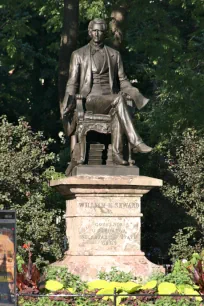
A more recent, but no less striking building at Madison Square is One Madison, originally known as The Saya. The 50-story and 617-ft-tall (188 m.) building was designed by Cetra Ruddy Architects.
The modern glass tower, built in 2009, contrasts with the many historic buildings around it. While all the early twentieth century skyscrapers around Madison Square Park were built as office towers, One Madison Park was designed as a residential tower. The top floors have magnificent views over the Metlife Tower and Midtown.
One Madison is one of the first of a new trend of ‘skinny’ skyscrapers in New York, which are characterized by their very high height-to-width ratio. One Madison Park’s height-to-width ratio is 12:1. The champion in this category is the 435 m. (1,428 ft.) tall Steinway Tower, with a ratio of about 24:1.
Madison Square Park
Madison Square Park is bordered by Fifth and Madison Avenues and 23rd and 26th Streets. Since its rededication in 2001 this park is once again one of the most enjoyable parks in Manhattan. From anywhere in the park, you have a great view of the surrounding architectural landmarks.
The park is littered with mostly nineteenth-century statues. At the southeast corner of the park is a statue of Senator Roscoe Conkling, who froze to death during the great 1888 blizzard. Another politician, William H. Seward, is honored with a statue situated near the southeast border of the park. The former governor of New York is shown seated. At the north end of Madison Square Park stands yet another statue, designed by Augustus Saint-Gaudens and dedicated in 1880. It depicts the Civil War admiral David Farragut.
Between 1876 and 1882, the right arm and torch of the Statue of Liberty were on display in the park, in order to raise money for the erection of the statue.
Madison Square Garden
Madison Square was also the location of the original Madison Square Gardens. Madison Square would soon be associated with these temples of entertainment.
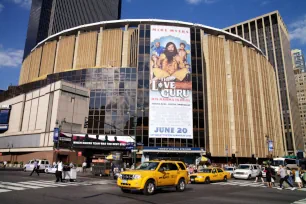
The first one opened in 1879 in a former hippodrome located at the northeast corner of Madison Avenue and 26th Street. The second Madison Square Garden, replaced the first one in 1889 and featured a concert hall, theater and roof garden. The building had a prominent tower built after the Giralda tower in Seville, topped by a nude statue of the goddess Diana.
In 1925 the building was demolished and Madison Square Garden moved to 8th Avenue and 49th Street. The current Madison Square Garden is located at Penn Station. (between 31st and 33rd Streets, 7th and 8th Avenues)
- Next: MoMA
- More Sights & Attractions in New York

